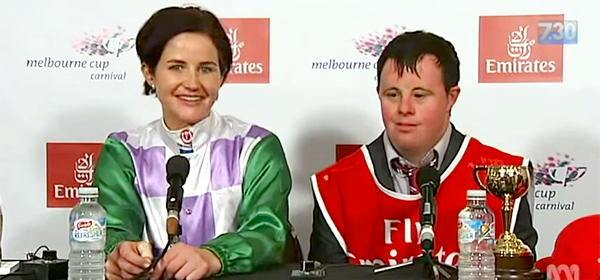When New Zealand-bred Prince of Penzance crossed the finish line at Flemington Racecourse on Tuesday, history was made. Jockey Michelle Payne became the first woman to win the Melbourne Cup in the race’s 155-year history.
Payne was elated at riding the 100-1 outsider to victory in “such a chauvinistic sport”. She described the big win as a “dream come true”, telling the media that as a child she had been teased by her friends for wanting to win the Melbourne Cup. “I can’t believe we’ve done it,” she said.
Her brother Stevie was her strapper and enjoyed a celebration hug straight after Michelle’s win. The 10 Payne children were raised by their horse trainer dad, Paddy after the death of his wife, in a car accident when Michelle was just six months old.
The Ballarat-born jockey called-out the sexist environment of horse racing, and said that, “I know of some owners who wanted to kick me off”.
But to those who doubted her, Payne had this to say: “I want to say to everyone else, get stuffed, because they think women aren’t strong enough, but we just beat the world.”
“I’m so pleased to win and hopefully it will mean people give more female jockeys a go,” she said.
The winning pair had good fortune in their corner, being allocated the advantage of the inside stall.
However, not all horses escaped the race victorious. Each year, the use and treatment of horses for entertainment for the Melbourne Cup is called into question.
This year, after taking a fall and breaking his leg, 10-yerd-old Red Cadeaux was taken to Werribee for treatment. The triple runner-up and sentimental favourite’s chances of survival at first appeared grim. He has had surgery and is expected to recover well and enjoyed a well-deserved retirement.
According to the Coalition for the Protection of Racehorses (CPR), 127 horses have died on Australian racetracks, and thousands more have ‘disappeared’ from the sport in the past 12 months.
That’s more than five times the number of horses running in the Melbourne Cup, activists say. However, statistics from Australian Racing show that on-track deaths account for less than one per cent, and deaths are down 133.
CPR claims that each year there are thousands of horses that suffer injuries and are subsequently killed off track and out of the public eye.
“Many horses will sustain injuries and then simply disappear … for most of these horses, our research has shown, that they end up being slaughtered,” CPR campaign director Elio Celotto said.
“Between 12,000 to 15,000 racehorses exit the racing industry every year … most of them will be sent straight to the slaughterhouse,” he added.
Last year, the shocking death of Japanese Thoroughbred Admire Rakti, just minutes after the Melbourne Cup race, stunned spectators around the world and cast a long shadow over Flemington. An inquest into the death eventually labelled a heart attack as the cause.
Read more at The Guardian
Read more at The Herald Sun
Opinion: Change in the air
Seeing a woman win the Melbourne Cup is a victory, not just in horseracing, but for society in general. It’s a victory because it’s yet another example where a woman has entered a traditionally male-dominated field. And we aren’t just seeing women compete – we’re seeing them win.
What this serves to do is smash the old views that both women and men should be confined to ‘their places’ in the world. When women claim space in arenas where they haven’t previously been welcomed, they are saying, “We have a right to be here too.”
So, even though I’m not generally interested in the Melbourne Cup, and abhor the exploitation of animals for any kind of human amusement, I appreciate that this victory represents something bigger than just winning a horse race. It represents an important change. It represents new hope for a lot of women who have been told to keep to their restrictive traditionally female roles.
I hope that Payne’s win encourages more women to enter the race. And considering that the target audience for the Melbourne Cup is both men and women, shouldn’t the female punters enjoy equal representation?
Did you watch the Melbourne Cup? Did you cheer and clap when Michelle crossed the finish line? How do you feel about the event as a whole?
The great image that we have used is taken from this clip of Michelle Payne’s post-race interview.

